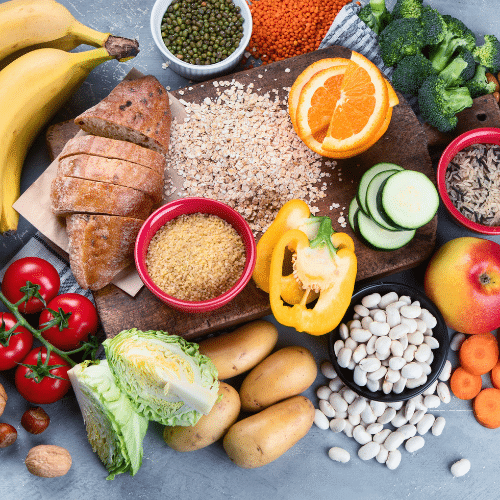Healing Your Gut Can Improve Your Menopause Symptoms
The connection between menopause and gut health is a topic not often discussed. Yet, the changing hormones in menopause can affect your gut health, which, in turn, can impact the severity of many of the uncomfortable symptoms experienced at this time.
Table of Contents
ToggleThis blog post will delve into the fascinating connection between menopause and intestinal health.
Discover how the symptoms you experience during this natural stage of life can influence the health of your gut.
Menopause and Gut Health
When your body is going through menopause, it’s no longer producing the same level of hormones it did before. This can cause various symptoms, like night sweats, hot flashes, weight gain, and fatigue.
Surprisingly, this hormonal change can also have an effect on your gut health. Specifically, it decreases the diversity of the flora in your intestines.
A recent study compared the gut microbiome of premenopausal women with postmenopausal women and men.
Post-menopausal women in the study had less diversity in the types of microorganisms in their intestines than premenopausal women did, and this decreased variety was more similar to what was seen in men.
Many menopausal women experience gastrointestinal (GI) issues, including constipation, diarrhea, indigestion, acid reflux, nausea, and bloating.
The decrease in diversity of the microbiome could be a contributing factor to these GI issues.
Gut Health and Hormones
Gut health is essential for estrogen metabolism.
The microbiome is composed of millions of good and bad bacteria. Specifically, a group of important bacteria and fungi helps regulate our estrogen metabolism. This group is called estrobolome and contains about 60 different types of bacteria and fungi.
When the GI system is unhealthy, estrogen metabolism is affected. Unhealthy bacteria can create an imbalance in estrogen levels, worsening changes already present with menopause.
In addition, the estrobolome can impact your sex drive, weight, and mood.
So, it’s a cycle; menopause impacts gut health, which then impacts menopause symptoms, including weight gain, insulin resistance, and decreased metabolism.
Gut Health Impact on Menopause Symptoms
GI Issues
Having an unhealthy gut can worsen GI problems that are common during menopause.
When your microbiome is out of balance, it can lead to indigestion, bloating, gas, diarrhea, or constipation.
That’s why keeping the bacteria in your intestines healthy is important—they help manage and reduce the severity of the GI symptoms that come with menopause.
Weight Management
Gut health likely impacts menopause weight. New studies reveal that an imbalanced gut may lead to excess fat, a sluggish metabolism, and insulin resistance among women in menopause.
Inflammation
Gut health and inflammation are closely intertwined.
During menopause, hormonal changes can lead to chronic inflammation. But did you know that an unhealthy microbiome can make things worse? An imbalanced gut is frequently associated with inflammation.
Inflammation intensifies joint pain, and it also hinders weight management while elevating the likelihood of chronic disease.
Mood Changes and Anxiety
The intestinal flora also play an important role in emotional well-being. Pertinent to menopause, an unhealthy gut can increase feelings of anxiety and depression, conditions that are common among this group.
How to Improve Your Gut Health During Menopause
Eat Foods High in Fiber

Fiber can help you increase the diversity of your gut microbiome, helping you balance your good and bad bacteria better.
Wondering how much fiber you need to eat a day? According to the 2020-2025 Dietary Guidelines for Americans, fiber’s daily requirement for women younger than 50 is 25 grams. Women aged 51 or older need 21 grams.
Simple changes in your diet can achieve this goal, including eating vegetables, fruits, whole grains, and legumes.
Make sure to increase your fiber intake slowly to prevent diarrhea and bloating.
Eat Foods With Probiotics and Prebiotics
Prebiotics are a form of dietary fiber that feeds good bacteria in our large intestine; and can be found in complex carbohydrates in fruits, vegetables, legumes, and whole grains.
Simply defined, probiotics are good bacteria and yeasts. Probiotics are mainly found in the digestive tract. These live organisms prevent the growth of bad bacteria.
Foods high in probiotics include fermented foods with live cultures, including yogurt, kimchi, miso, kefir, and sourdough bread.
Should I Take a Probiotic Supplement?
Taking a supplement can be beneficial; however, the decision takes into consideration personal needs and health background. A registered dietitian provider can always help determine if you need a supplement and which is the best one for you.
How to Choose a Supplement
- Choose probiotic products with at least 1 billion colony forming units (CFUs).
- Select probiotics containing Lactobacillus, Bifidobacterium, or Saccharomyces boulardii because these are some of the most researched strains.
- Find brands that have better testing procedures and studies to show their efficacy.
- Try out various probiotics: if you don’t see an improvement in a few weeks from one probiotic product, try a different product with a new strain of bacteria.
Eat Healthy Fat
Eating healthy fats is important for your overall and gut health. Healthy fats can help grow good bacteria in your gut and create a balanced microbiome. They also lower inflammation in the body and can aid in weight loss. Fats that will benefit you the most are omega-3 fats. Omega-3 fats include fish, walnuts, flax, and chia seeds. Try to include these foods in your everyday diet to help your gut! (4).
Foods and Drinks that Damage Your Gut
Sugar
A diet high in added sugar can damage your gut by eliminating the healthy bacteria. In addition, the unhealthy imbalance between good and bad bacteria can further damage your gut health by increasing sugar cravings.
Alcohol
Like sugar, drinking alcohol can disrupt the balance of good and bad bacteria. If you are looking to drink less alcohol, embrace the sober curious movement to gain ideas and support to help you drink less or stop drinking. This movement is not about stopping drinking because of alcoholism; it is about being mindful while drinking (or not drinking).
Processed Foods
Processed foods have all the elements that affect gut bacteria. In addition, these foods tend to lack nutrient diversity, are low in fiber, and are high in sugar and fat.
Soft Drinks
Excessive consumption of soft drinks is associated with poor gut health. More alarming, drinking sugar-sweetened soft drinks is linked to deaths from digestive diseases.
Conclusion
Healing your gut can lead to amazing results. Beyond helping any directly related issues such as diarrhea, constipation, and bloating, a healthy gut can improve your weight, insulin resistance, and even mental health.
“Improving Gut Health During Menopause” was written in collaboration with Registered Dietitian Meagan Murphy.

Dr. Su-Nui Escobar, a Registered Dietitian/Nutritionist in Miami, FL, is dedicated to empowering women in perimenopause and menopause to live healthier, more satisfying lives.
With a doctorate in clinical nutrition from the University of North Florida, she has expertise in menopause and weight loss, including the unique challenges faced by those on weight loss medications.
Su-Nui’s passion for her field is evident in her previous role as the Academy of Nutrition and Dietetics spokesperson.


